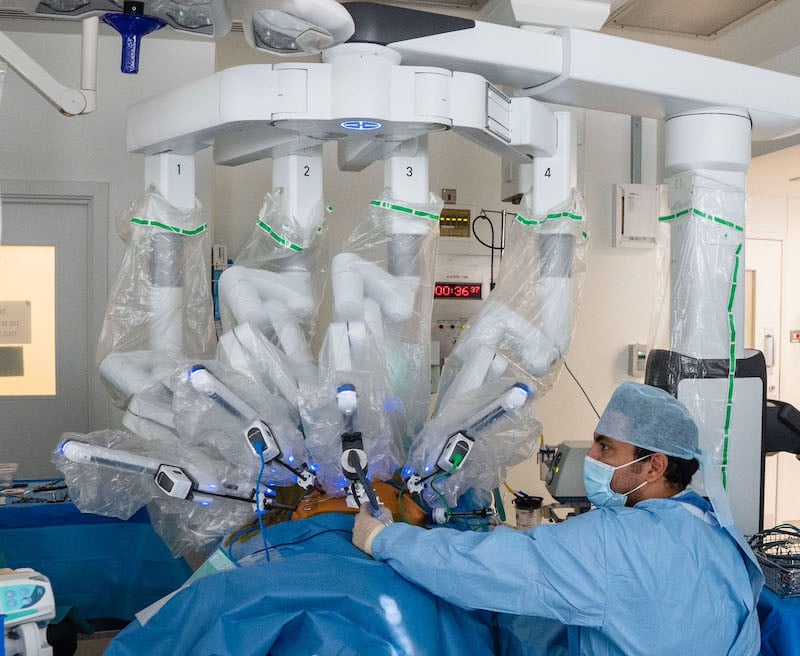Dr. Surender Dabas: One of the pioneers and leaders in advancing robotic techniques for cancer surgeries is Dr. Surender Dabas, one of the best robotic cancer surgeons in India and an International Mentor for Robotic Onco Surgeries. Dr Dabas has performed over 20,000 Complex Cancer Surgeries and 2,500 Robotic Surgeries. He has vast experience of 21 years in this field. He is a Head and Neck Oncology and Robotic Surgery Chief and Consultant of Head and Neck Oncology at Rajiv Gandhi Cancer Institute & Research Centre. He is actively involved in teaching Robotic Surgeries across India. He has also authored several scientific articles for national and international publications and was a prominent speaker at various medical conferences. Dr. surender Dabas holds executive Council Membership in the International Guild of Robotic, endoscopic Head and Neck Surgeons (IGREHNS) and the Indian Association for Surgical Oncology (IASO).
The Evolution of Robotic Surgery in Oncology
Robotic surgery is a cutting-edge technology that allows surgeons to perform complex and delicate operations with more precision, flexibility, and control than conventional techniques. In this blog post, we will explore the history and development of robotic surgery in the context of oncology, and how it is transforming the field of cancer treatment.
The Early Years of Robotic Surgery
The history of robotic surgery dates back to the 1980s when the first robotic surgical system was developed by the National Aeronautics and Space Administration (NASA) to perform remote surgeries in space. The system was called PUMA 560, and it was used to perform a neurosurgical biopsy in 1985. In 1988, another robotic system called PROBOT was developed by Imperial College London to perform prostate surgery. In 1992, the first laparoscopic surgery using a robotic system was performed by Dr. Philippe Mouret in France. The system was called AESOP, and it was used to manipulate the camera during the surgery.
The Breakthrough: da Vinci Surgical System
The breakthrough in robotic surgery came in 1999 when the US Food and Drug Administration (FDA) approved the da Vinci Surgical System, developed by Intuitive Surgical. The da Vinci system consists of a console where the surgeon sits and controls the robotic arms that hold the surgical instruments, a patient-side cart where the robotic arms are attached to the patient, and a high-definition 3D vision system that provides a magnified view of the surgical site. The da Vinci system enables the surgeon to perform minimally invasive surgeries with enhanced dexterity, accuracy, and visualization.
Evolution of the da Vinci System
Since its approval, the da Vinci system has been widely adopted by hospitals and surgeons around the world for various types of cancer surgeries. According to Intuitive Surgical, more than 7 million procedures have been performed using the da Vinci system as of 2020. The da Vinci system has also been continuously improved and upgraded with new features and capabilities, such as dual console, firefly fluorescence imaging, integrated table motion, single-site technology, and the Xi platform.
Best Surgical Oncologist in India
Dr. Surender Dabas, Best Surgical Oncologist in India: In the field of cancer surgery, one name that stands out is Dr. Surender Dabas, renowned as the best robotic cancer surgeon in India. With extensive experience and expertise in robotic-assisted surgical techniques, Dr. Dabas has revolutionized the approach to cancer treatment. His pioneering work in robotic surgery has enabled more precise tumor removal, reduced operative times, and decreased postoperative complications. Patients under his care have benefited from faster recovery times and improved long-term outcomes. The Importance of Multidisciplinary Approach: Surgery is crucial in cancer treatment, but it doesn't guarantee a complete cure. Success depends on factors like cancer type, stage, spread, and patient characteristics. A comprehensive plan combining surgery with other therapies increases the chances of long-term remission or cure. Ongoing research and medical advancements bring hope for better outcomes in the battle against cancer. So one of the best robotic cancer surgeon in india now.
Dr. Surender Dabas is currently working as the Vice Chairman & HOD of Surgical Oncology and Robotic Surgery in India at BLK Hospital, one of the best hospitals for surgical oncology in India. He has expertise in performing robotic surgeries for head and neck cancers, thyroid cancers, oesophagal cancers, lung cancers, colorectal cancers, gynaecological cancers, urological cancers, etc. Dr. Surender Dabas is also proficient in performing complex open surgeries for various cancers.
Conclusion
Robotic surgery is the next best step in the evolution of cancer surgery. It offers many benefits for both patients and surgeons, such as less blood loss, less pain, less scarring, faster recovery, shorter hospital stay, lower risk of infection and complications, better cosmetic outcomes, improved quality of life, higher precision, greater range of motion, better ergonomics, reduced fatigue, and enhanced learning opportunities. Robotic surgery is not a replacement for human skills and judgment but rather an extension of them. If you are looking for the best surgical oncologist in India who can offer you state-of-the-art robotic surgery for your cancer treatment, you can contact Dr. Surender Dabas at BLK Hospital as the best robotic cancer surgeon in india.
